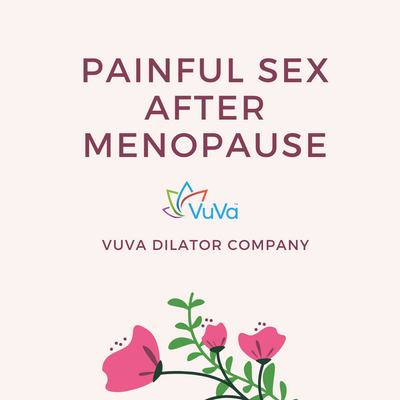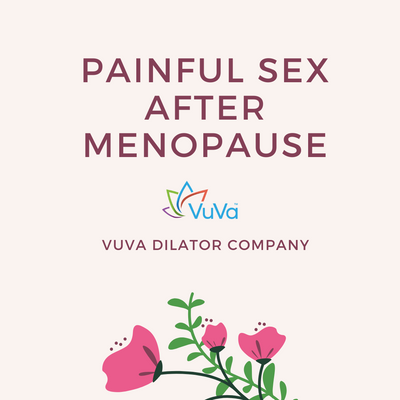
| Tara Langdale
Painful Sex: Causes, Solutions, and When to Seek Help
Sex should be a source of pleasure, intimacy, and connection. But for many women, it’s a source of pain, worry, and confusion. If you’re searching for answers about painful sex, you’re not alone. This is a common experience, and there are solutions available that can help you reclaim your comfort and confidence. In this guide, we’ll discuss the most common causes of painful sex, practical solutions you can try at home, when to seek help, and how innovative products like VuVa Magnetic Dilators—made in America—can play a vital role in your journey to relief.
Table of Contents
-
Understanding Painful Sex (Dyspareunia)
-
What Causes Painful Sex?
-
Physical Causes
-
Emotional and Psychological Causes
-
Medical Conditions
-
-
How to Identify Your Symptoms
-
At-Home Solutions for Painful Sex
-
Pelvic Floor Health and Its Role in Comfort
-
How VuVa Magnetic Dilators Can Help
-
When to Seek Professional Help
-
Empowering Yourself: Taking Charge of Your Sexual Health
-
Frequently Asked Questions
-
Encouragement and Next Steps
1. Understanding Painful Sex (Dyspareunia)
Painful sex, or dyspareunia, refers to persistent or recurrent pain in the genital or pelvic area during or after sexual intercourse. The pain can be sharp, burning, aching, or feel like deep pressure. It might occur only with penetration or even with gentle touch near the vaginal opening. This pain can have a profound impact on your quality of life, self-esteem, and relationships.
It’s important to know that you are not alone. Many women experience painful sex at some point in their lives, and it’s nothing to be ashamed of. The first step toward relief is understanding what’s causing your pain and knowing that solutions are within reach.
2. What Causes Painful Sex?
Painful sex can have a wide range of causes. Understanding them can help you find the right solution.
A. Physical Causes
1. Lack of Lubrication
-
Inadequate lubrication is one of the most common reasons for pain during sex. This can be due to insufficient arousal, hormonal changes (such as menopause, breastfeeding, or birth control), or certain medications (like antihistamines or antidepressants).
2. Infections
-
Yeast infections, urinary tract infections (UTIs), and sexually transmitted infections (STIs) can cause burning, itching, and pain during sex.
3. Allergies and Irritants
-
Allergic reactions to soaps, detergents, lubricants, condoms, or even certain fabrics can irritate the sensitive skin of the vulva and vagina.
4. Injury or Trauma
-
Childbirth, surgery, or injury to the pelvic region can cause pain, especially if there’s scarring or muscle tension.
5. Vaginismus
-
Vaginismus is an involuntary tightening of the muscles around the vagina, making penetration painful or even impossible. Many women with vaginismus describe the feeling as “hitting a wall” or experiencing intense burning or stinging.
B. Emotional and Psychological Causes
1. Anxiety and Stress
-
Worrying about pain, performance, or relationship issues can lead to muscle tension and reduced arousal, making sex uncomfortable.
2. Past Trauma
-
A history of sexual abuse, assault, or negative sexual experiences can trigger pain and involuntary muscle tightening during sex.
3. Negative Beliefs About Sex
-
Growing up with messages that sex is shameful or dangerous can create subconscious tension and fear.
C. Medical Conditions
1. Endometriosis
-
This condition causes tissue similar to the uterine lining to grow outside the uterus, leading to pain during sex and menstruation.
2. Pelvic Inflammatory Disease (PID)
-
PID is an infection of the reproductive organs that can cause deep pelvic pain during sex.
3. Menopause and Hormonal Changes
-
Lower estrogen levels can lead to vaginal dryness, thinning of the vaginal walls, and increased sensitivity.
4. Vulvodynia
-
Chronic pain or discomfort of the vulva with no identifiable cause, often described as burning, stinging, or irritation.
5. Lichen Sclerosus and Other Skin Disorders
-
These can cause thinning, whitening, and irritation of the vulvar skin, making sex painful.
3. How to Identify Your Symptoms
Understanding your specific symptoms is key to finding the right solution. Ask yourself:
-
Is the pain at the entrance of the vagina or deeper inside?
-
Does the pain occur every time or only with certain positions or activities?
-
Is there burning, stinging, or sharp pain?
-
Are there other symptoms like itching, unusual discharge, or bleeding?
-
Did the pain start suddenly or develop over time?
Keeping a journal of your symptoms can help you and your healthcare provider pinpoint the cause and track your progress with treatment.
4. At-Home Solutions for Painful Sex
While professional guidance is important, there are several steps you can take at home to reduce pain and increase comfort:
1. Prioritize Lubrication
-
Use a high-quality, water-based lubricant to reduce friction and discomfort.
-
Avoid products with fragrances, flavors, or harsh chemicals that can cause irritation.
2. Focus on Arousal
-
Spend more time on foreplay to allow your body to become fully aroused and naturally lubricated.
-
Try different types of touch, kissing, or massage to discover what feels best.
3. Communicate with Your Partner
-
Let your partner know what feels good and what doesn’t.
-
Try different positions or techniques to find what’s most comfortable.
4. Practice Relaxation Techniques
-
Deep breathing, mindfulness, and progressive muscle relaxation can help reduce anxiety and muscle tension.
5. Gentle Stretching and Pelvic Floor Exercises
-
Gentle yoga or pelvic floor stretches can help relax tight muscles.
-
Avoid over-strengthening exercises if you have pelvic floor tension.
6. Try Vaginal Dilators
-
Vaginal dilators are medical devices designed to gently stretch and relax the vaginal muscles over time. They can be especially helpful for women with vaginismus or muscle tension.
5. Pelvic Floor Health and Its Role in Comfort
The pelvic floor is a group of muscles that support the bladder, uterus, and rectum. If these muscles are too tight or reactive, they can cause pain during sex. Learning to relax and control these muscles is key to overcoming painful sex.
Signs of Pelvic Floor Dysfunction:
-
Pain during penetration
-
Inability to insert tampons or undergo pelvic exams
-
Feeling of tightness or “hitting a wall” during sex
How to Improve Pelvic Floor Health:
-
Practice relaxation exercises and deep breathing
-
Use vaginal dilators to gently stretch the muscles
-
Work with a pelvic floor physical therapist for personalized guidance
6. How VuVa Magnetic Dilators Can Help
VuVa Magnetic Dilators, made in America, are a unique and innovative solution for women experiencing painful sex. Here’s why they stand out:
1. Embedded Medical-Grade Magnets
-
VuVa dilators contain medical-grade magnets designed to promote increased blood flow and help relax the pelvic floor muscles during use. Enhanced blood flow can support healing, reduce muscle tension, and make dilation more comfortable and effective.
2. Gradual, Comfortable Progression
-
The dilators come in a range of sizes, allowing you to progress at your own pace and celebrate each milestone.
3. High-Quality, Body-Safe Materials
-
VuVa Magnetic Dilators are made from medical-grade, non-porous materials that are easy to clean and safe for long-term use.
4. Made in America
-
Supporting American manufacturing, VuVa dilators are crafted with care and quality assurance.
5. Empowerment and Confidence
-
Many women find that using VuVa Magnetic Dilators not only helps reduce pain, but also rebuilds confidence and comfort with their bodies.
How to Use VuVa Magnetic Dilators:
-
Start with the smallest size and use plenty of lubricant
-
Insert the dilator gently and slowly, never forcing it
-
Practice deep breathing and relaxation during use
-
Gradually move up to larger sizes as your comfort increases
-
Use regularly, as recommended by your healthcare provider or therapist
7. When to Seek Professional Help
While home care can make a big difference, there are times when it’s best to consult a healthcare professional:
-
Persistent or severe pain with every attempt at sex
-
Burning, itching, or unusual discharge
-
Bleeding after sex
-
Pain that interferes with daily activities or relationships
-
No improvement with at-home care
A doctor, gynecologist, or pelvic floor physical therapist can help diagnose the underlying cause and recommend the right treatment plan for you.
8. Empowering Yourself: Taking Charge of Your Sexual Health
Taking charge of your sexual health means advocating for yourself, seeking answers, and not settling for pain as “normal.” You deserve pleasure, comfort, and confidence in your intimate life.
Tips for Empowerment:
-
Educate yourself about your body and sexual health
-
Communicate openly with your partner and healthcare providers
-
Track your progress and celebrate small victories
-
Try innovative solutions like VuVa Magnetic Dilators to support your journey
9. Frequently Asked Questions
Q: Is it normal for sex to hurt sometimes?
A: Occasional discomfort can happen, but persistent or severe pain is not normal and should be addressed.
Q: Can I use VuVa Magnetic Dilators without a doctor’s guidance?
A: While many women use dilators at home, it’s best to consult a healthcare provider or pelvic floor therapist for personalized advice and support.
Q: How long does it take to see results?
A: Progress varies, but many women notice improvements within a few weeks to a few months of regular use.
Q: Are VuVa Magnetic Dilators safe?
A: Yes, they are made from medical-grade materials and designed for safe, comfortable use. Always follow instructions and clean them thoroughly.
10. Encouragement and Next Steps
If you’re struggling with painful sex, know that you are not alone—and you don’t have to live with pain. There are solutions available, from simple lifestyle changes to innovative products like VuVa Magnetic Dilators, made in America. With the right support, you can reclaim your comfort, confidence, and pleasure.
Don’t hesitate to reach out to a healthcare provider, pelvic floor therapist, or sexual health specialist. Healing is possible, and you deserve a fulfilling, pain-free intimate life.
Ready to take the next step?
Learn more about VuVa Magnetic Dilators and how they can support your journey to pain-free intimacy.
This article is for informational purposes only and does not replace professional medical advice. Always consult a healthcare provider for diagnosis and personalized treatment.













